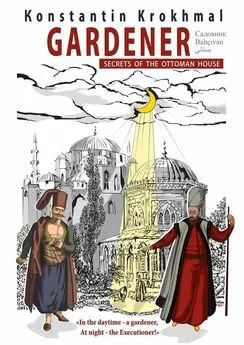Konstantin Krokhmal - Gardener. Secrets of the Ottoman house
- Название:Gardener. Secrets of the Ottoman house
- Автор:
- Жанр:
- Издательство:Литагент Ридеро
- Год:неизвестен
- ISBN:9785448552526
- Рейтинг:
- Избранное:Добавить в избранное
-
Отзывы:
-
Ваша оценка:
Konstantin Krokhmal - Gardener. Secrets of the Ottoman house краткое содержание
Gardener. Secrets of the Ottoman house - читать онлайн бесплатно ознакомительный отрывок
Интервал:
Закладка:
He was the Executioner 5 .
Only he was trusted to execute the objectionable and unquestioningly carry out assignments. When he was ordered, he did not think. He was killing.
Yes, the palace had its own rules, even for execution. The executioner had no right to kill with blood the tall faces, relatives of the Lord, so they should be strangled with a special ritual silk cord. The Sultan did not like blood, especially when he saw her at his relatives.
Unlike the Sultan’s family, the rest, any people disliked by the Sultan, including influential viziers, the gardener could kill at his own discretion. And then the blood flowed like a river…
Yes, he was an executioner, he killed those whom the Lord ordered to kill. And the garden was a compensation for these monstrous errands, and for all he was a simple gardener and looked after the flowers.
This took a long time, and then a custom appeared, when the condemned Master to death could escape his fate by defeating the chief gardener in the race through the palace gardens. The Vizier was summoned to a meeting with the chief gardener and after an exchange of greetings he was given a cup of frozen sweet sorbet.
If the sherbet was white, the Sultan granted the vizier a reprieve, and he had a month to rectify the situation. And if the sherbet was red, then the vizier should be immediately executed. And this was already done by the gardener. As soon as the condemned to execution saw the red sherbet, he had to take a sip and immediately run through the palace garden between the shady cypress and the rows of tulips. The main goal was to get to the gate on the other side of the garden that led to the fish market. And if he could run and pass through them, then all his sins were forgiven him. He again became a great vizier with unlimited powers.
Yes, it is difficult to imagine that the Topkapi Palace, in which petitioners from all over the world were received, was a terrible and terrifying place. In the main courtyard at the entrance to the palace, specially made two columns, on which the severed heads of people disobeyed or infidel Sultan were placed. During the periodic purges of the palace, from the unwanted or guilty in the courtyard, entire mounds were built from the languages of the victims. The gardener knew all this and remembered that sooner or later the purge would begin.
In the corner of the garden there was a special fountain 6 , with sparkling spring water. But everyone in the palace knew that it was forbidden to drink or wash hands in it. This fountain was made exclusively for the executioners, so that they could wash their hands and arms after the punishment procedure.
***
A small, bone-bound, heavy door opened noiselessly, and the Gardener, stepping over the high threshold, stepped inside. It was a large and spacious room, well lit by square windows. They were located high under the vaulted ceiling, painted in white, and therefore the room was surprisingly light. On the walls hung various devices, at first glance, not at all terrible. But only the executioner knew that the most familiar things can serve as an excellent weapon for killing unwanted Sultans.
The gardener closed the door on the bolt and walked confidently toward the shelving with tools.
– Tomorrow is an important day, and I need to prepare some tricky traps, – he whispered softly and began to make intricate things.
The executioner sincerely did not want anyone to reach the market gate and escape the just punishment of the Sultan.
He was not told who would run, but he knew exactly how to kill him. The executioner was allowed to kill the blood of all subjects, except for the relatives of the Sultan, they were to be executed only in one way – strangulation. Why is it so? The gardener knew the answer: because this type of execution since ancient times is considered shameful. The cruelest punishment for a person is not physical death, it was more terrible that when strangled, the soul can not leave the body, as if remaining in prison. In the people of such dead were called «hostages». The executioner knew, like no one else, that to die from suffocation was painful and painful. Death does not come instantly, and the convicted person remains conscious for a few seconds. In these instants he understands the approach of his end and experiences unbearable physical suffering, which ends in a terrible agony. At the same time, he was watched not only by the Sultan, but also by hundreds of spectators.
Such punishment was considered an impure death. Often at the time of strangulation, all the muscles in the body relaxed, and this led to complete emptying of the intestine and bladder, so that even after the execution the humiliation continued.
Whether it was a decapitation with an ax or ax, which was considered a quick and less painful death. Such a death allowed to avoid public agony, which was important representatives of noble blood. The crowd of spectators, eager for spectacles, should not have seen low dying manifestations. It was believed that only a strong and courageous warrior was prepared precisely for the death of cold weapons. When the condemned put his head on the block, he showed humility and resignedly accepted punishment. But all the same the main thing depended on the ability of the executioner. Often the convict himself or his relatives paid a lot of money to do his work with one blow, and death was quick and saved from violent torment. The gardener quickly enforced the sentence. The condemned man laid his head on a log, the thickness of which was to be no more than six inches 7 , which was ideally suited to the head of a man. A swing with an ax, a blow-that’s all.
Tomorrow’s fugitive was not Sultan’s blood, but he was very noble – it was the Vizier, the right hand of the Lord, whom he trusted as to himself. But something happened, and the Sultan suddenly began another purge of his associates, justifying his name – Selim the Terrible. Most likely, this was implicated in the heir Mustafa 8 , the closest pretender to the throne.
Such cruelty justified itself, because in the Ottoman Empire there were no bloody wars because of the throne, unlike Europe. The recent French Revolution 9, which began with the murder in prison of the 10-year-old son of the last French King Louis XVI and Marie Antoinette, did not have time to start, quickly drowned in the blood of their own leaders.
The gardener looked at the wall, lined with huge roughly chipped pieces of limestone. Behind this place was a fenced part of the palace, which was called C afe 10 . It was a «golden» cage where Sultan’s relatives lived, whom he had not yet killed 11 . He kept them next to him, allowing him to enjoy almost all the blessings of the palace in order to fully control their lives. Mustafa was in this cage and, most likely, became a bargaining chip in a never-ending backstage game.
Selim the Terrible knew how to overtake the fear of his courtiers: during his reign, so many great Viziers were executed, that they began to carry their wills with them.
The gardener took a scroll out of his robe pocket and put it in a large box filled to the top with the same orders. After a moment’s thought, he said calmly:
– Tomorrow I need to show a good performance, because the audience will be enough. But the most important spectator is, of course, he is the Great Sultan.
***
The morning turned out to be extremely cloudy. The sky was clouded by gray clouds that almost did not let in the sunlight, and the bright garden looked monotonous.
There was no one in the garden, but this does not mean that no one was following the upcoming action. On the highest balcony was located Sultan with the approximate, and a little lower on the terraces and from the open windows observed the rest.
The gardener was sitting in a luxurious gazebo on a dark green trestle. To his right was a closed vessel with a sherbet. Unlike the Vizier, to whom this message was intended, the executioner knew the color of the delicacy.
Behind the bushes appeared a recognizable silhouette in a bright robe, and it became clear that it was Khachi Salih Pasha. He cautiously, almost silently crossed the threshold, slightly bending his head, and slowly approached the Gardener.
Конец ознакомительного фрагмента.
Текст предоставлен ООО «ЛитРес».
Прочитайте эту книгу целиком, на ЛитРес.
Безопасно оплатить книгу можно банковской картой Visa, MasterCard, Maestro, со счета мобильного телефона, с платежного терминала, в салоне МТС или Связной, через PayPal, WebMoney, Яндекс.Деньги, QIWI Кошелек, бонусными картами или другим удобным Вам способом.
Интервал:
Закладка:










